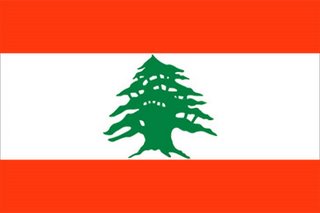by: Gen
You here about them just about every day on the news... but just how much do you know about Lebanon? Do you know the name of the President? Prime Minister? Capital? How about the culture? All these questions and more will be answered as you read my essay.
But first a few facts:
Flag:

Area: 4,035 sq. miles
Capital: Beirut
Official Language: Arabic
Government: Republic
President: Emile Lahoud
Prime Minister: Fouad Siniora
Population: 3,874,050
Currency: Livre
Now... lets move on to the history.
Lebanon was the homeland of the Phoenicians, a seagoing people that spread across the mediterranean before the rise of Alexander the Great. Carthage, which threatned Rome, was a Phoenician colony. Alexander burned Tyre, the leading Phoenician city, ending the Phoenician independence. This country became part of many empire, such as Persian, Roman, Byzantine, Arab, Crusader, and Ottoman.
Lebanon was part of the Ottoman Empire for 400 years, but following WWI, the area became part of the French Mandate of Syria. On September 1, 1920, France formed the State of Greater Lebanon as one the the Several ethnic enclaves within Syria. Lebanon was a largely Christian enclave but also included areas containing many Muslims and Druzes. On September 1, 1926, France formed the Lebanese Republic. The Republic was afterward a separate entity from Syria but still administered under the French Mandate for Syria.
Lebanon and Syria both gained independence in 1943, while France was occupied by Germany. General Henri Dentz, the Vichy High Commisioner for Syria and Lebanon, played a major role in the independence of both nations. The Vichy authorities in 1941 allowed Germany to move aircraft and supplies through Syria to Iraq where they were used against the British forces. The UK, fearing that Nazi Germany would gain full control of Lebanon and Syria by pressure on the weak Vichy government, sent its army into Syria and Lebanon.
After the fighting ended in Lebanon, General Charles de Gaulle visited the area. Under various politacal pressures from both inside and outside Lebanon, de Gualle decided to recognize the independence of Lebanon. On November 26, 1941, General Georges Catroux announced that Lebanon would become independent under the authority of the Free French government. Elections were held in 1943 and on November 8, 1943 the new Lebanese government unilaterally abolished the mandate. The French reacted by throwing the new government into prison. In the face of international pressurem the French released the government officials on November 22, 1943 and accepted the independence of Lebanon.
The allies kept the region under control until the end of WWII. The last French troops withdrew in 1946. Lebanon's unwritten National Pact of 1943 required that its president be a Christian and its prime minister be a Muslim. Lebanon's history since independence has been marked by alternating periods of political stabilty and turmoil (including a civil conflict in 1958) intersperesed with prosperity built on Beirut's position as a regional center for finance and trade.
Religion-wise (estimated)
35% Christians
35% Shia Muslims
25% Sunni Muslims
5% Druzel
(and a very small percentage are Jew)
Culture
Lebanon has been a major crossroad for civilizations for millennia, so it is unsurprising that this small country possesses an extraordinary rich and vibrant culture. Lebanon's wide array of ethnic and religious groups contributes to the country's rich cuisine, musical and literary traditions, and festivals. Beirut in particular has a very vibrant arts scene, with many performances, exhibits, fashion shows, and concerts held throughout the year in galleries, museums, theatres, and public spaces.
Most Lebanese are bilingual, speaking Arabic and French, this is why Lebanon is a member of the Organization Internationale de la Fracophonie; however, English has become popular.
Several international festivals are held in Lebanon, faeturing world-reowned artists and drawing crowds from Lebanon and elsewhere. Among the most famous are the summer festivals at Baalbek, Beiteddine, and Byblos.
No comments:
Post a Comment